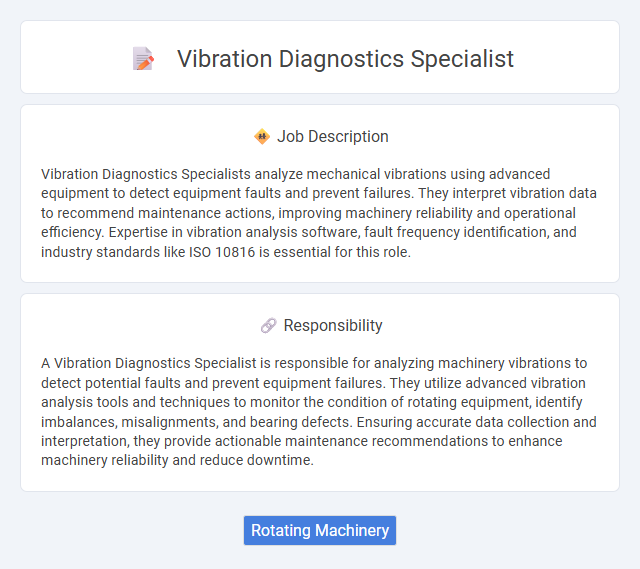
Vibration Diagnostics Specialists analyze mechanical vibrations using advanced equipment to detect equipment faults and prevent failures. They interpret vibration data to recommend maintenance actions, improving machinery reliability and operational efficiency. Expertise in vibration analysis software, fault frequency identification, and industry standards like ISO 10816 is essential for this role.
Individuals who possess strong analytical skills and a keen attention to detail are likely to be well-suited for a Vibration Diagnostics Specialist role. Those who enjoy working with technology, especially in mechanical or industrial settings, may find this job fulfilling and align well with their technical aptitude. Conversely, candidates who struggle with repetitive tasks or lack patience for in-depth equipment analysis might find the demands of this position less compatible with their personal strengths.
Qualification
Vibration diagnostics specialists require expertise in mechanical engineering, including knowledge of vibration analysis techniques and condition monitoring. Proficiency in using vibration analysis tools such as accelerometers, data collectors, and software like FFT analyzers is essential. Strong analytical skills and experience interpreting vibration data to diagnose machinery faults ensure accurate maintenance recommendations and enhance equipment reliability.
Responsibility
A Vibration Diagnostics Specialist is responsible for analyzing machinery vibrations to detect potential faults and prevent equipment failures. They utilize advanced vibration analysis tools and techniques to monitor the condition of rotating equipment, identify imbalances, misalignments, and bearing defects. Ensuring accurate data collection and interpretation, they provide actionable maintenance recommendations to enhance machinery reliability and reduce downtime.
Benefit
Employing a Vibration Diagnostics Specialist likely enhances machinery reliability by identifying potential equipment failures early, reducing downtime and maintenance costs. Their expertise in analyzing vibration data probably improves operational efficiency and extends asset lifespan. Organizations might experience significant financial savings and safer working environments through proactive vibration monitoring.
Challenge
Vibration Diagnostics Specialists likely face the challenge of accurately interpreting complex vibration data to predict equipment failures with high reliability. The role probably demands continuous adaptation to evolving diagnostic technologies and methodologies. Managing unexpected machine anomalies might require rapid problem-solving under pressure to minimize downtime and maintain operational efficiency.
Career Advancement
Vibration Diagnostics Specialists play a critical role in predictive maintenance by analyzing vibration data to identify equipment faults early, enhancing operational efficiency and minimizing downtime. Mastery of diagnostic tools such as vibration analyzers and condition monitoring software increases the potential for promotion to senior analyst or maintenance manager roles. Continuous professional development through certifications like Vibration Analysis Level I, II, and III accelerates career growth in industries including manufacturing, aerospace, and energy.
Key Terms
Rotating Machinery
A Vibration Diagnostics Specialist analyzes and monitors the condition of rotating machinery using advanced vibration analysis tools and techniques to detect faults such as imbalance, misalignment, bearing defects, and gear wear. Expertise in interpreting vibration spectra, time waveforms, and phase analysis enables effective predictive maintenance and reduces unexpected equipment downtime. Proficiency with sensors like accelerometers and software platforms including FFT analyzers and condition monitoring systems is essential for optimizing machinery performance and ensuring operational reliability.
 kuljobs.com
kuljobs.com